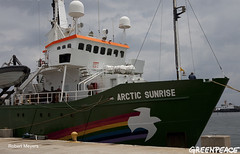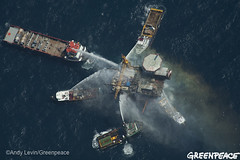 This morning, as we were preparing the ship for the next leg of our journey, we got the news that another oil rig, the Vermillion 380, has exploded in the Gulf of Mexico, risking the lives of at least 13 workers who were rescued from the site.
This morning, as we were preparing the ship for the next leg of our journey, we got the news that another oil rig, the Vermillion 380, has exploded in the Gulf of Mexico, risking the lives of at least 13 workers who were rescued from the site.
Right now, the Arctic Sunrise is docked in St. Petersburg, restocking supplies and preparing to head back out into the Gulf for the second leg of our three-month long research tour of the Gulf. Our science coordinator has been sorting out the last minute details with the scientists, our cook is restocking the kitchen, and the deck crew has been getting the ship in the best possible shape for the next part of our journey. In the past month, we’ve settled into a good, productive rhythm of work, as the crew managed the logistics for plankton tows, diving, whale watching, and more. Some of the results of what we’re doing right now won’t be available for months, but we all know that it’s important to be producing independent science now, so that we can help shape the policies for the future.
 But meanwhile, in the Gulf of Mexico and elsewhere, the oil industry hasn’t been waiting for the science that will tell us just what we’ve lost, the true nature of the impact on the many forms of marine life in these waters. Offshore drilling hasn’t stopped, and today’s disaster won’t be the only one.
But meanwhile, in the Gulf of Mexico and elsewhere, the oil industry hasn’t been waiting for the science that will tell us just what we’ve lost, the true nature of the impact on the many forms of marine life in these waters. Offshore drilling hasn’t stopped, and today’s disaster won’t be the only one.
We’ve all been talking about the BP Deepwater Disaster as a wakeup call, which is why it feels particularly chilling, and a little bit scary, to be reminded that as we’re measuring what we’ve lost, the oil industry is still doing business as usual. In the past ten years, 69 people have died on offshore rigs, and there have been 858 fires and explosions, according to the Mineral Management Service. It’s not insignificant, and it’s not stopping. Despite the rhetoric and the promises from the administration, we’re still drilling offshore, and every day we risk another disaster.
Just this morning, activists from our sister ship, the Esperanza, were arrested after a 40 hour occupation of a rig in the Arctic, where they stopped Cairn Energy from drilling for a couple of days. Everyone on board the Arctic Sunrise, has been following along on the website, and I watched my friend and colleague Simran McKenna, hanging over the icy water, doing everything in his physical power to make an immediate, dramatic stand.
There’s much work to be done to change the policies that guide our energy use—some immediate, and some slow. But as we assess the impact, and study the scope of the disaster, as we measure the irreplaceable things that we have lost, and as we reach out to the policymakers who will determine our future, we should remember that this is also an urgent situation with an unacceptable level of risk. We must all broadcast that urgency loud and clear. How many more wake up calls do we need?
Join us in telling Congress: No new drilling. Period.

